- Home
- P. D. James
The Lighthouse Page 32
The Lighthouse Read online
Page 32
Kate quietly moved a chair next to her and sat close. She said, “We’re going to catch this man, but we need your help, particularly now Mr. Dalgliesh is ill. We need to know what happened last night. You said you gave Mr. Boyde the cope.”
Mrs. Burbridge was calmer now. She said, “He came to see me after dinner. I had my meal here, as I usually do, but I knew he was coming. We’d arranged it earlier. I told him that the cope was finished, and he wanted to see it. If things had been different, if it hadn’t been for Mr. Oliver’s murder, Adrian was going to take it to the Bishop. He’d suggested it because for him it would have been a kind of test. I think he felt ready to leave the island, at least for a few days.”
Kate asked, “So that was why the cope was packed in a box?”
“It was put in the box, but not to be taken off the island. We knew that couldn’t happen, not yet. It was just that I thought Adrian would like to wear it, perhaps when he was saying Evensong. He did most evenings. He wouldn’t wear it to celebrate Mass, that wouldn’t have been suitable. I could see, when he was admiring it, that he would like to put it on, so I said it would be helpful to know how it sat, if it was comfortable. That was just an excuse really. I wanted him to have the pleasure of wearing it.”
Kate said, “Do you remember at what time he left here carrying it?”
“He didn’t stay long. I could sense that he wanted to get back to his cottage. After he left I put out the light here and went to listen to the radio in my sitting room. I remember looking at my watch because I didn’t want to miss a programme. It was five to nine.”
Benton said, “You sensed that he wanted to get back to his cottage. Is that usual? I mean, did he seem in more of a hurry than normal? Were you surprised that he didn’t stay longer? Did he give you the impression that he might be calling on anyone on the way home?”
The question was important, the answer crucial, and Mrs. Burbridge seemed to realise this. After a pause she said, “It didn’t seem unusual at the time. I thought that he had some work to do or a radio programme he wanted to listen to. It’s true he usually didn’t hurry away. But it wasn’t exactly hurrying, was it? He was here for twenty-five minutes.”
Benton asked, “What did you talk about?”
“The cope, the stole and other pieces I’d been working on. And he admired the altar fronts. It was just chat. We didn’t mention Mr. Oliver’s murder, but I think he was preoccupied. He was deeply affected by Mr. Oliver’s death. Of course we all were, but with him it went deeper. But it would, wouldn’t it? He understood about evil.”
Kate got up. She said, “I don’t want you to be alone in this flat, Mrs. Burbridge. I know that everyone will be accommodated in the house, but even so I’d prefer you not to be alone in your flat at night.”
“Oh, but I won’t be. Mrs. Plunkett doesn’t want to be alone either, and she suggested I move in with her. Jago and Dan are going to move my bed for me. She would come here, I know, but she does like her television. I’m afraid neither of us will get much peace. People who aren’t normally interested in television will want to watch the news now. Everything has changed, hasn’t it?”
“Yes,” said Kate. “I’m afraid it has.”
“You asked me to write down what we were doing last night. I brought the paper away with me, but I haven’t done anything with it. I couldn’t bring myself to write down what happened. Does it matter?”
Kate said gently, “Not now, Mrs. Burbridge. You’ve told us what we needed to know. I’m afraid you may have to make a formal statement later, but don’t worry about that for now.”
They thanked her and left, and heard the door being locked behind them.
Benton said, “So he took an hour to get home. That walk across the scrubland, even in the dark, couldn’t have taken more than half an hour, probably less.”
“You’d better time it, preferably after dark. We can be reasonably certain Boyde didn’t go for a stroll, not on a starless night and carrying a bulky package. He called on someone, and when we know who we’ll have Calcraft.” She looked at her watch. “It’s taken twenty minutes to get that information, but we couldn’t hurry her and it’s important. I want to be on hand when Dr. Glenister arrives. We’ll have to keep well clear of her, but I think we should be there when they take the body away.”
They were entering Kate’s apartment when the telephone rang. Dr. Glenister was giving evidence at the Old Bailey and would be tied up for the next two days. There was a perfectly competent local man, and she suggested that they use him. Any exhibits could be taken to the lab when the body was removed.
Replacing the receiver, Kate said, “Perhaps it’s just as well. We’ve got work to do at the scene ourselves, and I want that stone if we can get it. If the tide’s coming in, we may have wasted too much time already.”
Benton said, “Not wasted, ma’am. We had to see everyone on the island and ensure their safety. And we needed Mrs. Burbridge’s evidence. If Boyde had given her any clue about where he was going, the case could’ve been solved. There’s a limit to what we can do with only the two of us. And we should be all right with the tide if it turned just before ten last night. That should give us roughly an hour before it’s high again.”
“Well, let’s hope you’re right.”
After a moment’s hesitation, she said, “You did well in there, Sergeant. You knew what to say to Mrs. Burbridge, what would comfort her.”
“I’ve had a religious education, ma’am. It comes in useful sometimes.”
She looked at his dark, handsome face. It was as impassive as a mask. She said, “And now to ring Jago and ask him to meet us with the buggy and the climbing equipment. We can’t tackle that cliff without him. Someone—I suppose Maycroft—will have to relieve him at Harbour Cottage.”
6
* * *
To Benton it had seemed an unconscionable time before Maycroft managed to free himself from his other preoccupations and went down to the harbour to take over from Jago and explain to him that he was wanted. Sensing that Maycroft would prefer to do this alone, they waited outside the lighthouse with the buggy, Benton resisting the temptation to keep gazing at his watch, an irritating obsession which only served to lengthen time.
On impulse he said, “I suppose it’s safe to use him.”
“As long as we don’t let him see what, if anything, we manage to find.”
“I was thinking of the climb, ma’am.”
“We’ve no choice. AD doesn’t see Jago as our man, and he’s never yet been wrong.”
And now Jago was with them. He and Benton loaded the buggy with the climbing equipment, and Kate took the wheel. They bumped over the headland without speaking. Benton knew that she would want to preserve the ground around the scene of crime, and when they were some twenty yards from the chapel she stopped the buggy.
She said to Jago, “What we’re looking for was probably thrown over the top or the lower cliff somewhere near the chapel. Either Sergeant Benton-Smith or I must abseil down to make a search. We’ll need your help.”
Still Jago didn’t speak. Kate slithered down between bushes and jutting rocks to the lower cliff, then, with the others following, walked along the narrow plateau until, looking up, she assessed they were under the chapel. They moved to the edge and looked down. The layered granite, in parts fissured, in others smooth as polished silver, fell some eighty feet to the sea, broken only by jutting spurs like hanging baskets, the crevices festooned with foliage and clusters of small white flowers. At the foot of the cliff was a cove with no beach, heaped up to the rock face with stones and boulders. The tide was coming in fast.
Kate turned to Jago. “Is it possible to get down? Do you see any problems?”
At last Jago spoke. “Not getting down, I don’t. How d’you intend to get back up? You need an experienced climber.”
Kate asked, “Is there no other way of getting into the cove?”
Jago said, “Walk further along and look for yourself, Inspector. It’s always cut o
ff, no matter what the tide.”
“And no chance of swimming round the headland?”
Jago’s face was eloquent. He shrugged. “Not unless you want to be cut to pieces. The underwater rocks are like razors.”
Benton said, “My grandfather was a climber, and he taught me. If you’re willing to come down with me, we should be able to get up—that is, if there’s a classified climb.”
“There’s one about thirty yards south of the chapel. It’s the only way up, but it’s not for a novice. What’s the hardest climb you’ve done?”
“Tatra on the Dorset coast. It’s near St. Anselm’s Head.” Benton thought, And don’t, for God’s sake, ask me when that was.
And now, for the first time, Jago looked him in the face. “Are you Hugh Benton-Smith’s grandson?”
“Yes.”
There was silence for a few seconds, then Jago said, “OK, let’s get on with it. You’d better give me a hand with the gear. We haven’t much time.”
They left Kate on the edge of the cliff. Within minutes they were back. Jago led the way confidently, the ropes slung over his shoulder. Following him with the rest of the equipment, Benton thought, He knows every inch of this cliff. He’s done this climb before.
Dropping the ropes, Jago said, “You’d better take your jacket off. The shoes look all right. Try one of these helmets for fit. The one with the red badge is mine.”
The boulders here were larger and the under-cliff narrower than on any other part they’d seen. Jago put on his helmet, then quickly selected the rock he wanted and, with the other two watching, took three wide tapes, threaded them together and secured them round the boulder with a karabiner. Watching him screwing the heavy metal clip shut, Benton reflected that he hadn’t thought of the word “karabiner” for over a decade. And the tapes were called slings. He must remember the names. Jago uncoiled the rope, threaded the middle through the karabiner and, stretching his arms in wide sweeps, re-coiled both halves of the rope and hurled them over the cliff. They fell, rhythmically uncoiling, patterned in blue and red on the shining air.
For Benton time stopped, and for one disorientating second spun out of control, then latched on to memory. He was fourteen again, and standing with his grandfather on top of that cliff on the Dorset coast. His grandfather, whom he had always called Hugh, was a twice-decorated fighter pilot in the Second World War and, after those tumultuous years, had never adjusted to an earthbound world in which the death of the best of his friends had left him a reluctant half-guilty survivor. Even in adolescence, Benton, loving him and desperately anxious to please, had sensed something of the loss and shame which lay behind his grandfather’s brittle, half-mocking carapace. Hugh had been an obsessive amateur climber, seeing in that no man’s land between air and rock something his grandson recognised as more than a sport. Francis—he was never called Benton by Hugh—had longed to share his passion, knowing even then that what his grandfather was teaching him was how to master fear.
In his first year at university, when Hugh had fallen to his death climbing in Nepal, his enthusiasm for the rock face dwindled. None of his friends climbed. His life was full of other, more insistent interests. Now, in that second of memory, he heard Hugh’s voice. The climb’s a VS—Very Severe—but I think you’re ready for it, Francis. Are you?
Yes, Hugh. I’m ready.
But it was Jago’s voice he was hearing. “The climb’s a VS, but as you’ve done Tatra you should be ready for it. OK?”
And this, he knew, was his last chance to withdraw. Soon he could be standing on that narrow fringe of stony sea-thrashed shore, facing a dangerous climb, perhaps with a murderer. Mentally he spoke Kate’s words: AD doesn’t see Jago as our man, and he’s never yet been wrong.
He looked at Jago and said, “I’m ready.”
He took off his jacket and felt through the fine woollen jersey the chill of the wind like a cold poultice on his back. After buckling on the harness with its waistband of karabiners, slings and nuts, he tried the two helmets, found one that fitted and strapped it on. He glanced at Kate. Her face was rigid with anxiety, but she didn’t speak. He wondered if she wanted to say, You don’t have to do this, I’m not ordering you, but knew that to put the onus on him would be an abdication of her responsibility. She could stop him, but she couldn’t order him to climb. He wondered why he was so glad of that. Now she took a plastic exhibit-bag and a pair of search gloves from her case and handed them to him. Without speaking, he shoved them in his trouser pocket.
He watched while Jago satisfied himself that the slings round the boulder were secure, then clipped the rope through the karabiner at his waist. It came back to him so easily now, the rope over the right shoulder and round his back. No one spoke. He remembered that this routine preparation for a climb had always been done in silence, a formal, purposeful putting on of courage and resolution, almost, he thought, as if his grandfather had been an ordained priest and he the acolyte, both performing some wordless but long-familiar sacerdotal rite. Jago was an unlikely priest. Trying to relieve fear with sardonic humour, Benton told himself that he, Benton, was more likely to end as the sacrificial victim.
He walked to the very edge of the cliff, braced his feet and leaned backwards into space. This was the moment of commitment, and it brought with it the remembered mixture of terror and exhilaration. If the belay didn’t hold, he would plunge some eighty feet to his death. But the rope tightened and held. For a second, almost horizontal, he raised his eyes to the sky. The scudding clouds were racing in a vortex of white and pale blue, and beneath him the sea thudded against the rock face in relentless waves of sound that he seemed to be hearing for the first time. But now all was easy, and he felt, after more than a decade, some of that boyhood exhilaration in bouncing and sliding down the rock face, the left hand controlling the rope from behind, the right on the rope in front, feeling it slide through the karabiner, knowing that he was in control.
His feet struck ground. Quickly he released himself and shouted that he was down. Pulling on his search gloves, he surveyed the narrow strip of sea-smoothed rocks and pebbles, assessing where best to begin. The tide was coming in strongly, splurging over the smooth humps of the farthest outcrop, swirling into the deep rock pools, advancing and then briefly retreating to glitter the treacherous surfaces of rounded stones and the shards of broken granite. Time was against him. With every wave the field of search narrowed. Eyes down, he crouched forward yard by careful yard. He knew what he was looking for: a heavy stone but small enough to be held in the hand, a tool of death on which, with luck, there would still be some trace of blood. His heart grew more leaden with every yard. Even on this narrow fringe of shore the stones were piled in thousands, many of the right size and weight and most polished by centuries of the sea. He was wasting time on a fruitless search, and he still had that climb to face.
Minutes passed, and his hopes were fading. The exhilaration of the abseil was forgotten. He pictured Kate waiting above for the call which would signal success. Now there would be only a single shout, to let Jago know it was time for him to abseil down.
And then he saw, close to the edge of the cliff, something that should surely not be there on this untrodden shore: a pale flutter of litter. Going up to it, he gazed down and for a second was tempted to fling his arms wide and give a shout of triumph. What he saw was an egg-shaped stone half enclosed in what was obviously the remnant of a surgical glove. Most of the thin latex must have been torn when it fell, rolled in the waves of the receding tide and blown away, but one finger and a small part of the palm were still intact. Carefully he picked up the stone and examined the surface. The reddish stain, which didn’t seem part of the natural stone, could surely only be blood. It must be blood. It had to be blood.
He put his trophy into the exhibit bag, closed it and ran stumbling towards the abseil rope. He tied the bag to the end of it and, putting both hands to his mouth, gave a triumphant bellow. “Got it! Heave it up.”
Look
ing up, he could glimpse Kate’s face gazing down. She gave a wave of the hand, and the rope with its package rose, bumping gently against the rock face.
Almost immediately it was lowered again, and Jago was coming down as quickly as if in free fall, the stocky body seeming to dance against the cliff. He released himself, gave a tug on the rope. It fell in coils at his feet. He said, “The climb’s only thirty yards away, round this outcrop of rock. I’ll fix the belay.”
The layered and fractured cliff towered above them. The surf was already breaking over their feet.
Jago said, “You can lead. If you’ve done Tatra it shouldn’t be too difficult. It’s steep and exposed, but well protected at the crucial moves. The crux is the roof at the top of that crack. There’s a peg just before it, right under the roof. Make sure you clip in. Don’t worry, it’s an overhang, so, if you lob, at least you’ll fall clear of the rock.”
Benton hadn’t expected to lead. He thought, Jago planned this from the beginning, but, then, he’s controlled every aspect of this climb. He was too proud to argue about the order, but Jago would have depended on that too. He made a bowline at the end of the rope and attached it to his harness while Jago made a careful belay on a large boulder at the foot of the climb, then took hold of the rope and said, “OK. If you’re ready.”
And now, as if to emphasise the inevitability of the climb, a large wave thundered in, almost sweeping them off balance. Benton began climbing. The first fifteen feet were not too difficult, but he thought carefully about each hand and foot placement, feeling for the cracks in the rock, moving upwards when he was confident he had a hold. After fifteen feet he took a nut from the rack at his waist and slid it into a crack, jiggling until it was firm. He attached a runner, clipped in the rope, then moved on with more confidence. The rock became steeper but was still firm and dry. He found another crack and threaded in another nut and runner.
He was some thirty feet above ground when—suddenly and to his horror—he froze, all confidence gone. He had stretched his arms too widely to find a hold and found himself spread-eagled against the rock face, his shoulders so taut that they felt racked. He was terrified to try for another foothold in case he lost his precarious balance. His cheek was placed hard against the granite, which now felt wet and icy cold, and he realised that the rock face was damp with his sweat. There was no call from Jago, but he remembered his grandfather’s voice calling down to him on the fourth climb they’d done together. This is classified VS, so there’ll be a hold. Take it slowly, Francis. It isn’t a race. And now, after what seemed an eternity but must have been no more than half a minute, the tension in his shoulders eased. Tentatively he moved his right hand up and found a hold a few feet higher, then holds for his feet. The panic was over, and he knew it wouldn’t return.

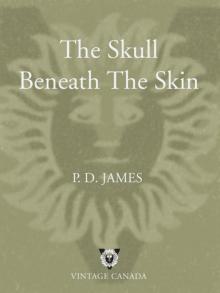 The Skull Beneath the Skin
The Skull Beneath the Skin A Taste for Death
A Taste for Death The Children of Men
The Children of Men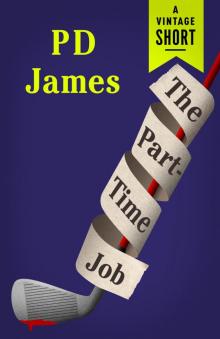 The Part-Time Job
The Part-Time Job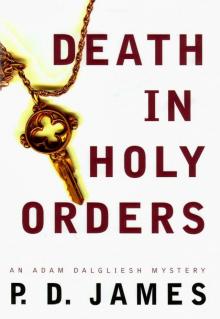 Death in Holy Orders
Death in Holy Orders The Victim
The Victim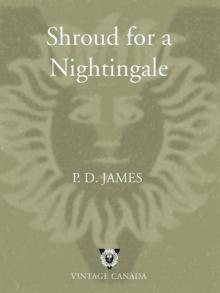 Shroud for a Nightingale
Shroud for a Nightingale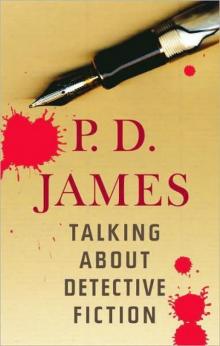 Talking about Detective Fiction
Talking about Detective Fiction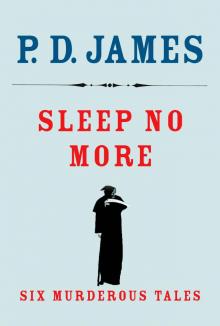 Sleep No More
Sleep No More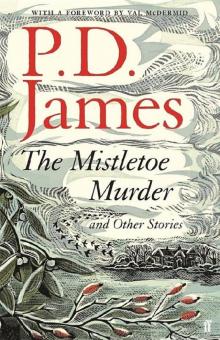 The Mistletoe Murder and Other Stories
The Mistletoe Murder and Other Stories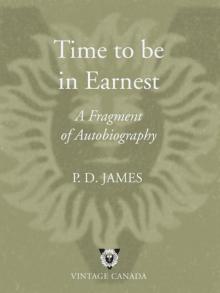 Time to Be in Earnest
Time to Be in Earnest Original Sin
Original Sin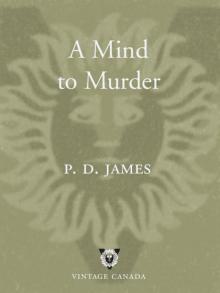 A Mind to Murder
A Mind to Murder Cover Her Face
Cover Her Face Innocent Blood
Innocent Blood Devices and Desires
Devices and Desires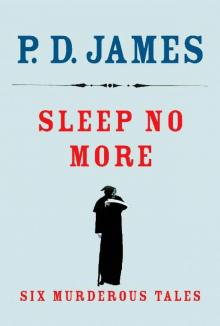 Sleep No More: Six Murderous Tales
Sleep No More: Six Murderous Tales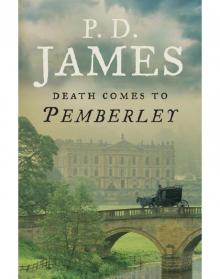 Death Comes to Pemberley
Death Comes to Pemberley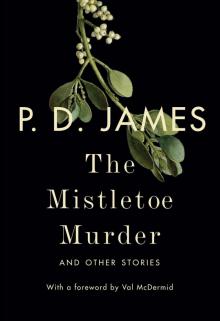 The Mistletoe Murder
The Mistletoe Murder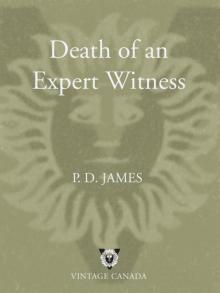 Death of an Expert Witness
Death of an Expert Witness The Private Patient
The Private Patient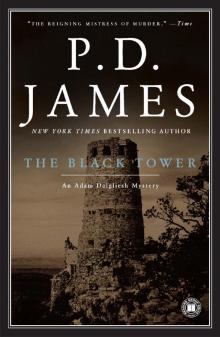 The Black Tower
The Black Tower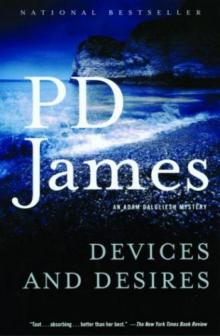 Devices & Desires - Dalgleish 08
Devices & Desires - Dalgleish 08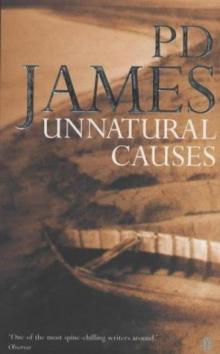 Unnatural Causes
Unnatural Causes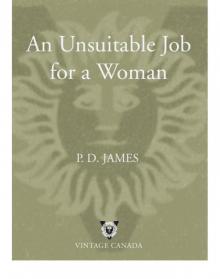 An Unsuitable Job for a Woman
An Unsuitable Job for a Woman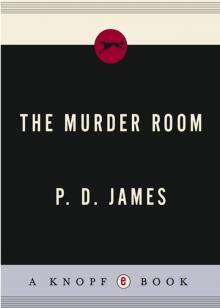 The Murder Room
The Murder Room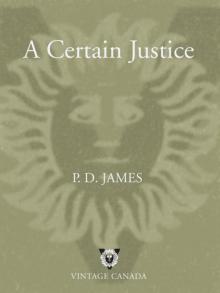 A Certain Justice
A Certain Justice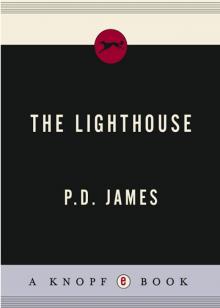 The Lighthouse
The Lighthouse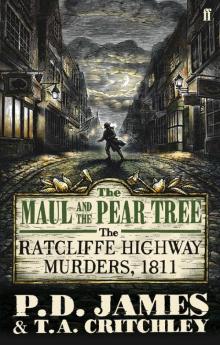 The Maul and the Pear Tree
The Maul and the Pear Tree